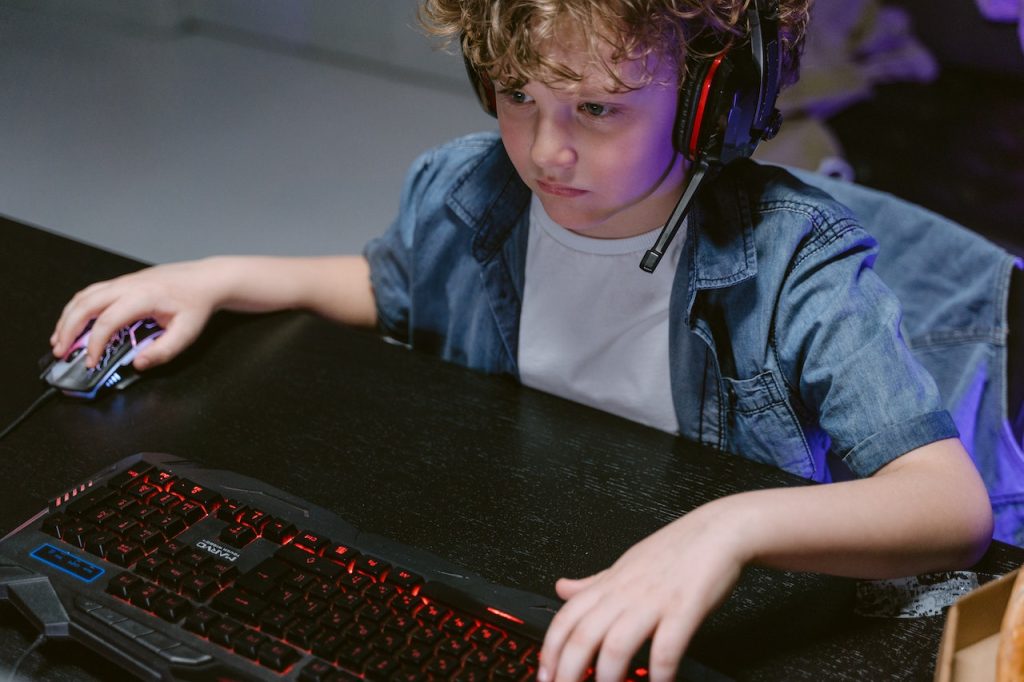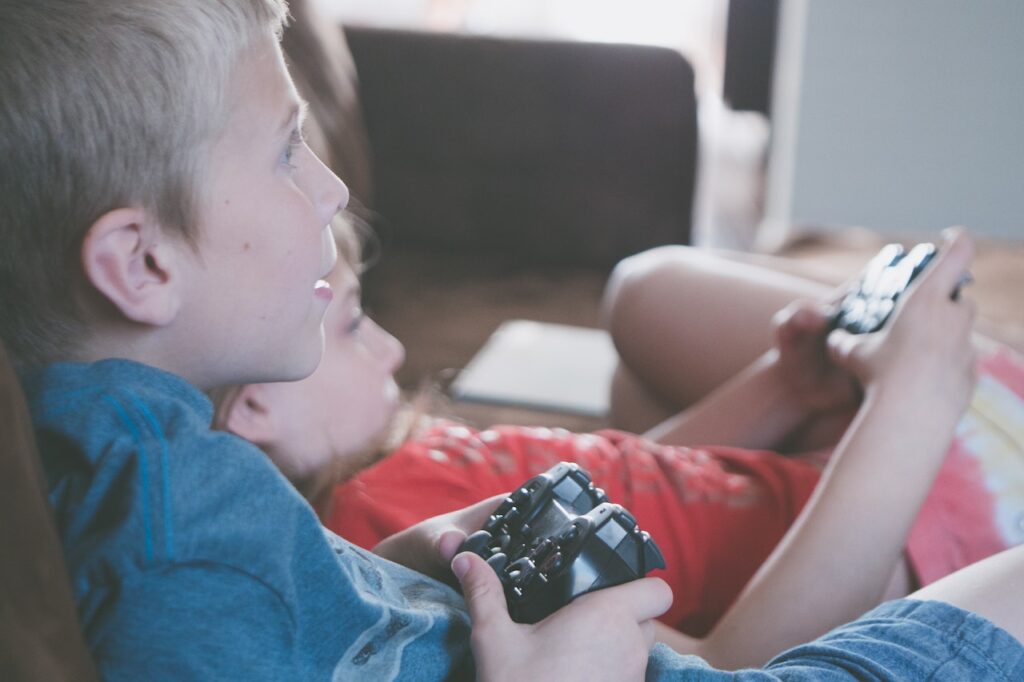Playing video games is satisfying for adults and kids because of the entertaining character they have. Nowadays, the market is full of different video games, paid or free, from various genres like shooting, arcade, sports and adventure, fashion, etc.
Video games are also very popular among children because of the colorful graphics, stress relief, releasement of dopamine hormone (happiness hormone) while playing, and such. But you may think that video games only cause harm.
That’s not true. Video games can increase children’s social, problem-solving, and concentration skills. Contrary to this, there are downsides to video games as well. So, parents may ask themselves: Is it OK for our kids to play video games?
What are the Benefits of Video Games for Kids

Contrary to popular belief from parents, video games can be beneficial for children. So, in the following paragraphs, we’ll look at how video games can enhance cognitive skills, develop social skills, and improve emotional regulation and mental health.
· Enhancing Cognitive Skills
Video gaming can help children develop an ability to quickly recognize and memorize objects, and be detail-oriented, focused, and concentrated.
Furthermore, video gaming can develop problem-solving skills and motivate children to finish a given task or problem.
Also, most video games require our little ones to improve their hand-eye coordination. Last but not least, video games help children understand 2D and 3D objects, or in other (more fancy) words, video games develop children’s spatial reasoning.
· Developing Social Skills
Video games give our kids the opportunity to meet and make gaming friends. Because of multiplayer games, our kids can belong to a virtual community and interact with kids from different cultures and regions. This contributes to developing empathy and understanding for others.
· Improving Emotional Regulation and Mental Health
Studies show that by playing video games, children can “run away from reality” and relax their minds. This is caused by dopamine (happiness hormone), that’s released when playing video games.
Risks of Video Games for Children

Although video games can benefit children, being full-time gamers can affect our kids’ physical and mental health. We’ll go over the risks of video games for children in the following paragraphs.
· Potential Addiction
Statistics show that 8.5% of children are addicted to video games. And this number only keeps growing. Parents can recognize some of the signs that point to gaming addiction, such as:
- Isolation;
- Frequent gaming;
- Talking only about the game;
- Stress when not allowed to play;
- Bad hygiene and eating habits;
- Insomnia;
- Low interest in school;
- Changed behavior;
Consequences of long-term excessive gaming can include anxiety, aggression, and depression.
· Exposure to Violent or Inappropriate Content
Some video games can expose our kids to inappropriate content. Children might copy this content and start behaving more aggressively.
Younger children are more exposed to the influence of this content, so it’s crucial to pick age-appropriate video games for younger kids.
· Physical Health Risks
Frequent and excessive gaming can lead to several physical health problems, such as:
- Sedentary behavior;
- Eye strain and vision problems;
- Concentration problems;
- Headaches;
- Neck and back pain;
- Weakened muscles and bones;
- Low fitness;
- Weakened immune system because of indoor isolation;
We, as parents, can’t allow our little ones to destroy themselves in front of us, and we need to develop strategies to reduce indoor sedentary behavior and promote outdoor activities.
Factors Affecting Children’s Video Game Habits

Despite the interest of almost every child in playing video games, there are differences between age and gender in video gaming habits.
For example, preschool children are usually monitored and controlled by parents when playing video games. Other statistics show that boys are more interested in video games than girls.
Moreover, teenagers are less controlled by their parents when playing video games. I mean, who wants to argue with a teenager about video games?
· Family Dynamics and Parental Involvement
The most important modern parental role is to be included in children’s habits and promote healthier gaming rules.
We, parents, also mustn’t hesitate to set rules about the type of video games our kids are allowed to play and, of course, we should monitor the hours spent on gaming.
But parents can be challenged by pressure to conform to gaming trends, so you need to have an open conversation with children and talk about the benefits and risks of video gaming.
Don’t let your kids’ individuality be questioned by others. Balancing individual preferences with social expectations can help your kids build a strong character and choose right over wrong themselves.
How to Encourage Healthy Video Game Habits in Children

Parents need to encourage healthy video gaming habits in children by promoting several rules regarding gaming, such as:
- Setting a healthy gaming routine;
- Promote outdoor and family activities;
Establish healthy communication with your children, listen to their preferences, state your thoughts and rules, and make balanced decisions that suit both sides.
Conclusion
As mentioned above, it is OK for your child to play video games, but only when every parent or caregiver has open communication with their kids. Balance gaming time, establish rules around which games your children play, and make sure that your children continuously follow these rules.
Strong and trusty parent-kid bonds make healthy individuals. You can even try playing video games together with your kids! After all, family time is time well spent.
FAQ
What are some signs that my child may be addicted to video games?
Signs that your kid is addicted to video games are:
- Isolation and playing the video game all the time;
- Stress and anger if you don’t let your child play the game;
- Talking only about the game;
- Lower interest in school;
Should I restrict my child’s video game use completely?
You shouldn’t completely restrict children’s video game use. But you shouldn’t allow your children (especially the younger ones) to play video games that expose them to inappropriate content.
Can video games cause violence or aggression in children?
Kids can imitate what they’ve seen in the video game. So if the video game contains violence and aggression, the answer is yes.
How can I find age-appropriate video games for my child?
You can find age-appropriate video games for your child by checking ESRB or PEGI age ratings and other reviews that provide information about whether a game is suitable for your kid.
Is it better for my child to play educational video games?
Yes, it is. Your kid should play educational video games because they improve learning and educational skills.







